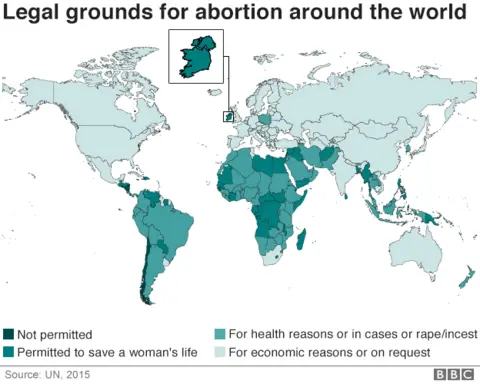Timeline: Ireland and abortion
Ireland has voted decisively in a referendum to reform the country's strict abortion laws, which had effectively banned all terminations.
It was Ireland's sixth referendum on the issue, and the country's younger voters led it in a two-thirds landslide in favour of ending the ban.
Here we look back at how one of the most controversial legal issues in Irish history unfolded over more than a century-and-a-half.
1861 - The law
Abortion is first banned in Ireland in 1861 by the Offences Against the Person Act, and stays in place after Irish independence.
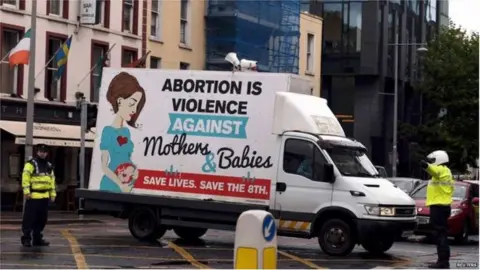 Reuters
Reuters1983 - A referendum
The Eighth Amendment to the Republic's constitution, or Article 40.3.3, is introduced after a referendum.
It "acknowledges the right to life of the unborn and, with due regard to the equal right to life of the mother, guarantees in its laws to respect, and, as far as practicable, by its laws to defend and vindicate that right".
1992 - The X case, and another referendum
A 14-year-old suicidal rape victim is initially prevented by the courts from travelling to England to terminate her pregnancy. It is a controversy that will become known as the X Case.
The ruling prompts demonstrations by both anti-abortion and pro-choice campaigners across Ireland, in New York and London.
However, the ruling is later overturned by Ireland's Supreme Court. It says the credible threat of suicide is grounds for an abortion in Ireland.
No government since then has enacted legislation to give medical practitioners legal certainty as to when terminations can be carried out.
In November that year, as a result of the X case and the judgement in the Supreme Court appeal, the government put forward three possible amendments to the constitution.
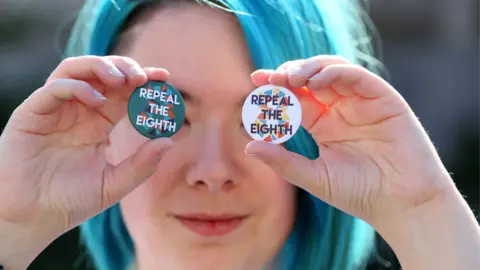 Getty Images
Getty ImagesThey are enumerated as the twelfth, thirteenth and fourteenth amendments. Two of them are passed.
The Thirteenth Amendment said the abortion ban would not limit freedom of travel from Ireland to other countries for a legal abortion.
The Fourteenth Amendment said Irish citizens had the freedom to learn about abortion services in other countries.
However, the Twelfth Amendment is rejected. It had proposed that the possibility of suicide was not a sufficient threat to justify an abortion.
2002 - A referendum on suicide
Another referendum is held and the people of Ireland are asked if the threat of suicide as a ground for legal abortion should be removed.
It is again rejected (this time marginally) by voters.
2010 - European Court of Human Rights ruling
After three women take a case against Ireland, the European Court of Human Rights rules the state has failed to provide clarity on the legal availability of abortion in circumstances where the mother's life is at risk.
2012 - The Savita Halappanavar case
A campaign to liberalise abortion gathers momentum, after Indian woman Savita Halappanavar dies in a Galway hospital after she is refused an abortion during a miscarriage.
Her husband, Praveen Halappanavar, says she repeatedly asked for a termination but was refused because there was a foetal heartbeat.
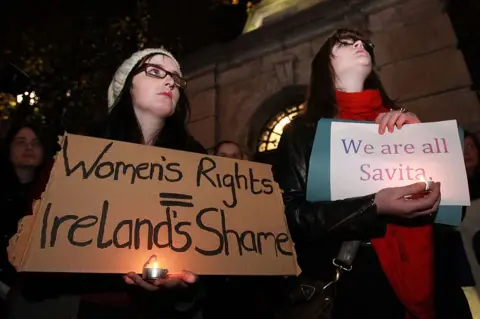 Getty Images
Getty ImagesWhen asked if he thought his wife would still be alive if the termination had been allowed, Mr Halappanavar told the BBC: "Of course, no doubt about it."
Following her death, about 2,000 protesters assemble outside the Irish parliament in Dublin to call for the Irish government to urgently reform the Republic's abortion laws.
Candle-lit vigils are held around the country.
2013 - A new law to protect women
Abortion legislation is again amended to allow terminations under certain conditions - the Protection of Life During Pregnancy Act is signed into law.
It legalises abortion when doctors deem that a woman's life is at risk due to medical complications, or at risk of taking her life.
It also introduces a maximum penalty of 14 years imprisonment for having or assisting in an unlawful abortion.
This law gives effect to the 1992 Supreme Court ruling that abortion is permitted where the mother's life, as opposed to her health, is at risk.
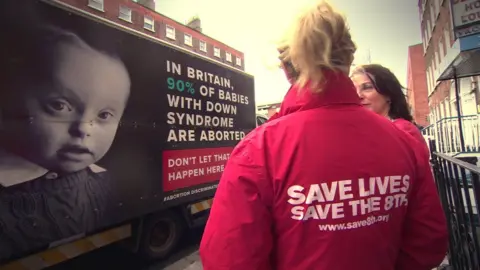
2015 - The UN calls for another referendum
The United Nations Committee on Economic, Social and Cultural Rights recommends a referendum on abortion, saying it is concerned at Ireland's "highly restrictive legislation" and calls for a referendum to repeal Article 40.3.3 of the Constitution.
It says it's "particularly concerned at the criminalization of abortion, including in the cases of rape and incest and of risk to the health of a pregnant woman; the lack of legal and procedural clarity on what constitutes a real substantive risk to the life, as opposed to the health, of the pregnant woman; and the discriminatory impact on women who cannot afford to obtain an abortion abroad or access to the necessary information".
The committee calls for a revision of the 2013 Protection of Life During Pregnancy Act and urges the adoption of guidelines to clarify what constitutes "a real substantive risk" to a woman's life.
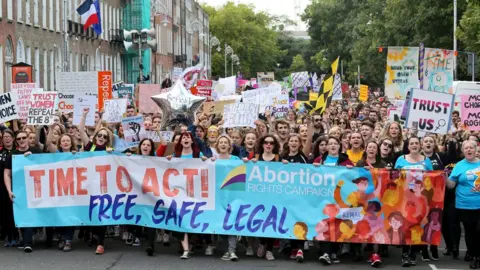 AFP/getty
AFP/getty2016 - The United Nations weighs in on human rights
The United Nations Human Rights Committee says that Ireland's ban on abortion subjected a woman carrying a foetus with a fatal abnormality to discrimination and cruel, inhuman or degrading treatment.
It calls for the strict prohibition to be reversed, including reforming the right to life of the unborn in the constitution if necessary, to allow women to voluntarily terminate a pregnancy safely.
The case involves a woman called Amanda Mellet who had to travel abroad for an abortion.
The UN committee says the hospital where she was treated did not provide any options regarding the foetus's remains and she had to leave them behind.
Three weeks later, the ashes are unexpectedly delivered to her by courier.
Ms Mellet files a complaint with the UN over her experiences.
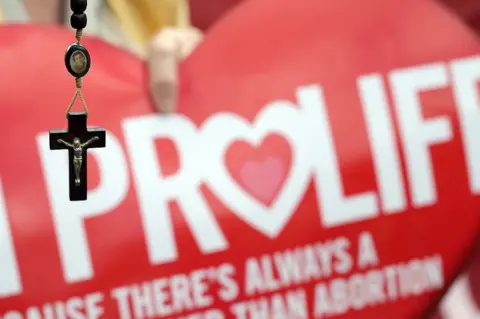 Getty Images
Getty ImagesShe is later awarded compensation by the Irish government - thought to be the first time this had happened.
The move is hailed as "highly significant" by pro-choice campaigners.
Meanwhile, the terms of reference are outlined for a Citizens' Assembly to begin examining the Eighth amendment. This is a public body set up to advise the Irish government on a number of ethical and political dilemmas facing the Irish people.
2017 - A Citizens' Assembly makes recommendations
The Citizens' Assembly votes to recommend the introduction of unrestricted access to abortion.
It votes 64% to 36% in favour of having no restrictions in early pregnancy.
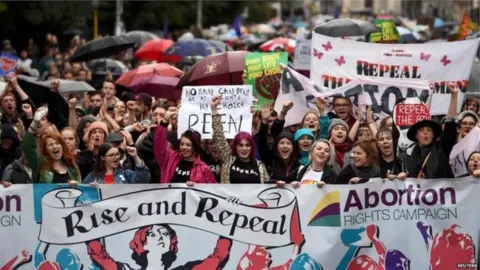 Reuters
ReutersThe chairperson, Justice Mary Laffoy, said: "The members voted that they wanted to remove Article 40.3.3 from the constitution, and for the avoidance of doubt, to replace it with a provision in the constitution, which would make it clear that termination of pregnancy, any rights of the unborn, and any rights of the pregnant woman are matters for the Oireachtas (Irish Parliament).
"In other words, it would be solely a matter for the Oireachtas to decide how to legislate on these issues."
However, anti-abortion campaigners dismiss the results of the ballots as a "muddled and confused farce".
An Oireachtas committee in 2017 also recommends substantial reform of the law.
The committee's chair, Senator Catherine Noone, concludes that "we need some change" and in order to effect that the constitution needed to be amended to remove Article 40.3.3.
The Irish government says it will hold a referendum in 2018 on whether to change the abortion laws.
2018 - A historic vote for choice
In March, Irish Housing Minister Eoghan Murphy signs an order to set the date for an abortion referendum. The wording is then finalised, giving the go-ahead for voters to have their say on the issue.
On 25 May, voters go to the polls, where the ballot asks if they wish to approve the 36th Amendment to Ireland's constitution - a bill which would repeal the Eighth Amendment, the ban on abortion.
Turnout is 64.51%, and the result is just short of two-thirds in favour of ending the country's ban on abortion: 66.4% yes to 33.6% no.
The Yes vote allows the government in Dublin to introduce legislation allowing abortion in the first 12 weeks of pregnancy, and between 12 and 24 weeks in exceptional circumstances.
"What we have seen today really is a culmination of a quiet revolution that's been taking place in Ireland for the past 10 or 20 years," says Prime Minister Leo Varadkar.
